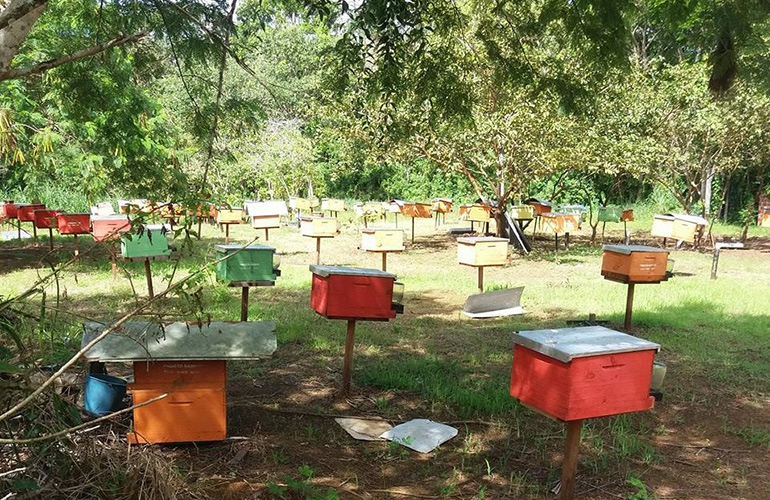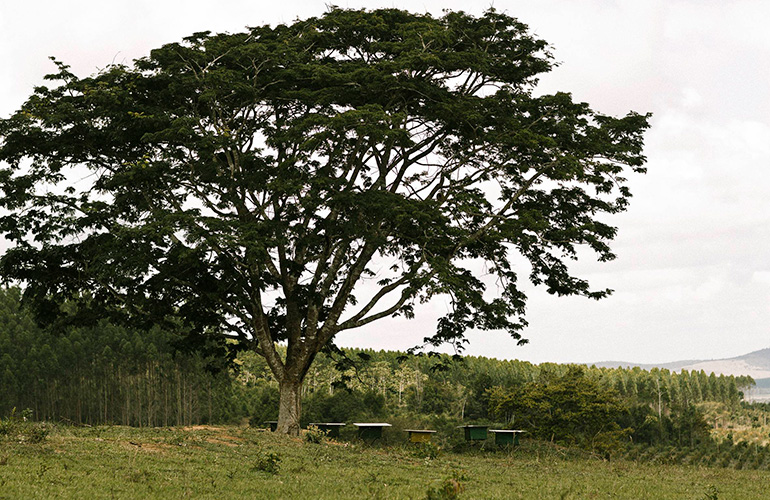Veracel encourages multiple land uses to help local residents improve their livelihoods. In an effort to support honey production, local beekeepers have been able to keep their hives on the company’s land since 2012.
“In addition to helping honey-producers establish cooperative associations, we provide extensive training and practical beehive kits for beekeepers,” explains Veracel’s Social Responsibility Specialist Izabel Bianchi. “Then we enable the beekeepers to set up their hives so that their worker bees can harvest nectar in about 60 000 hectares of our eucalyptus plantations.”
So far about 4 470 beehives with about 60 000 bees living in each hive have been set up around Veracel’s plantations, where the buzzing of busy bees is today part of the forest scene. The thriving bee populations also help conserve local biodiversity around the eucalyptus plantations at a time when bee populations worldwide are in serious decline.

Beehives on Veracel's lands in Bahia, Brazil.
Bahia’s beekeeping boom
In 2017, 155 families benefited from the cooperation with Veracel, producing about 99 tonnes of saleable honey. Some 90% of the annual honey production is exported to the United States and Germany.“The beekeeping initiative has become very important both socially and economically. We aim to expand the scheme in future by providing training for 100 families each year,” adds Bianchi.
Gílson Pereira da Paixão, a member of the ASAPMAG association of beekeepers in the municipality of Guaratinga, feels that local associations’ partnerships with Veracel have been a cornerstone in the development of beekeeping in Bahia. “It was Veracel who provided us with the first beekeepers kits, and most importantly enabled us to set up beehives in lands owned by the company,” he says.
“Beekeeping has recently expanded significantly in Southern Bahia,” adds Matthew Martinez Valverde, a beekeeper from Eunápolis. “Our region is now nationally renowned for its eucalyptus honey, which is favoured by consumers because of its light colour, sweet aroma and pleasant taste. Veracel’s support has been crucial in forming cooperatives and making our operations more professional.”
A “House of Honey” is meanwhile being constructed in Eunápolis to serve as a local commercial and trading centre for the local beekeepers’ associations. This will facilitate direct exports from Bahia, and reduce local honey-producers’ dependency on wholesale traders based in Southern Brazil.
Making the most of company lands
This honey-making and money-making scheme typifies the efforts made by Stora Enso in Brazil and other countries to find ways to harmonise multiple land uses to the benefit of many stakeholders. In Southern Bahia, Veracel is a large land owner, so the company’s land use practices are closely watched by local stakeholders, including landless people’s social movements.
“To ensure our long-term license to operate we must demonstrate our social responsibility through enhanced agroforestry models and other actions that benefit local communities,” says Bianchi. “Enabling such multiple uses of the company’s plantations provides welcome opportunities for income generation for our neighbours, and this in turn improves local attitudes towards the company.”
A similar beekeeping project is in its early stages at Montes del Plata, Stora Enso’s joint operation in Uruguay. Other examples of our community engagement work where multiple land uses are encouraged include cattle grazing in Brazil and in Uruguay, and the production of rice and agroforestry cash crops in plantations in Laos.






